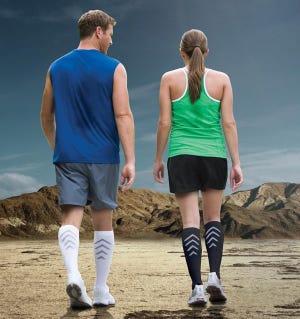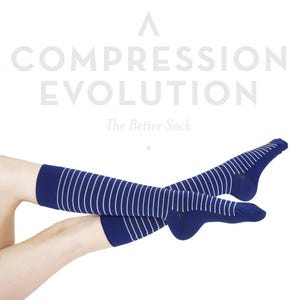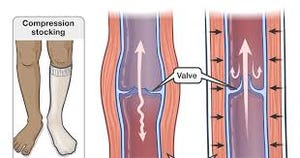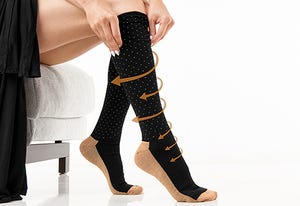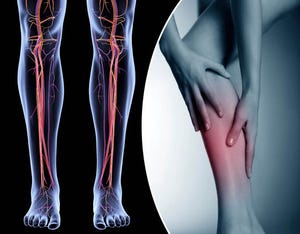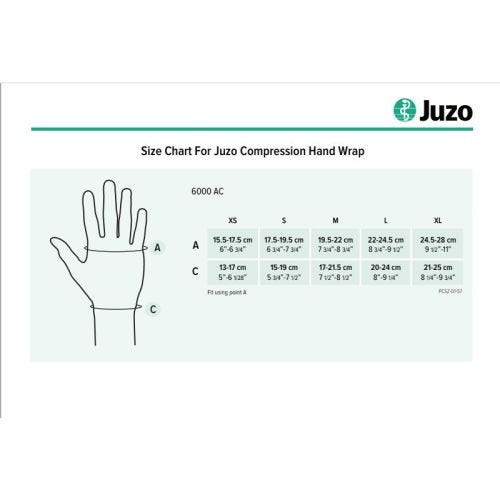If compression socks support healthy circulation all day, do they support healthy circulation all night, too? Compression garments such as socks and tights are usually intended for daytime wear, but there are special situations in which it's OK to sleep in compression socks.
Compression Socks for Sleep Apnea
A specialized application of graduated compression socks is relieving sleep apnea — requiring the socks to be worn while the user is sleeping, of course. Treating sleep apnea usually requires using a CPAP (continuous positive airway pressure) machine with its mask and hoses every night. Some people who have sleep apnea have a lot of trouble adjusting to the machine.
It's also sometimes possible to treat obstructive sleep apnea with surgery or a dental appliance that is as inconvenient as CPAP. It's no wonder that sleep apnea sufferers look for alternatives. One of them is compression socks.
A group of researchers at the Clinique La Pitié-Salpêtrière in Paris were analyzing their successes in treating varicose veins with compression garments when they noticed something surprising: For a number of patients, compression socks not only helped with vein issues, they helped with obstructive sleep apnea, too.
Dr. Stefania Redolfi of the clinic devised an experiment to determine whether wearing compression socks at night was really making the difference in sleep apnea that it seemed to be making. She and her colleagues recruited two groups of people who had sleep apnea, did baseline measurements of the severity of the condition, and asked one group to start sleeping in compression socks for a week. The other group was asked to wait a week before trying compression socks. Dr. Redolfi asked the first group to stop wearing the socks after the first week to see if there were any residual benefits of wearing the socis.
The researchers found that wearing compression socks reduced the size of leg veins by 62%. That wasn't surprising. What was surprising was that they found that wearing socks at night also reduced the size of neck veins in both groups by 60%. Shrinking the veins in the neck took pressure off the windpipe and reduced the severity of the snoring, snorting, and periods of breathlessness associated with sleep apnea in both groups of patients who wore the socks.
How much did using compression reduce sleep apnea? In this study, the nightly reduction in episodes of breathlessness (apnea) was 36%. That's not a cure, but it is enough for considerable improvement in sleep quality at about 1/10% of the cost of a CPAP machine and many thousands of dollars less that the cost of surgery.
Another reason to wear compression socks at night
Another group of people who benefit from wearing socks or tights with graduated compression at night are people who have orthostatic hypotension. Orthostatic hypotension is a condition that causes dizziness or sometimes complete loss of consciousness when moving from lying down to standing up. People who have orthostatic hypotension may be prone to passing out as soon as they get out of bed in the morning. Falling to the floor is a really bad way to start your day.
Wearing compression socks at night may keep enough blood flowing back up the veins of the legs to the heart and brain to prevent orthostatic hypotension. They are an inexpensive, side effects-free alternative to other treatments of the condition involving blood pressure drugs.
You shouldn't stop using prescribed treatments for sleep apnea or orthostatic hypotension without consulting your doctor first. Chances are that your doctor will tell you that it's OK to wear compression socks all night but you should continue other treatments just to be sure. Wearing graduated compression at night may just help you feel better in the morning — but that is worth something, too.
What if you just like to sleep in your compression socks?
It's OK to sleep in your compression socks. You can even wear compression socks 24 hours a day if you like. You just shouldn't wear the same compression socks 24 hours a day, day after day, night after night. You need to wash your legs at least once a day, particularly if you have skin problems caused by venous insufficiency, and it's always good to change your socks daily as a matter of good personal hygiene. Ideally, you should wear one pair of compression socks during the day and a different pair of compression socks while you sleep.
Don't use compression socks or compression tights 24 hours a day with the expectation that it will help you with vein issues, however. Graduated compression doesn't do your veins a lot of good while you are lying down, because venous compression primarily helps your veins overcome the force of gravity. When you are lying down, assuming that you sleep lying down, the valves in your veins aren't as stressed as they are when you are sitting or standing, so the added effects of compression socks aren't as noticeable for problems like varicose veins and venous reflux disease. However, for the other two previously mentioned conditions, the effects of wearing compression socks when you sleep can be very noticeable, and you may feel better even if you are just wearing compression socks at night for vein issues.
Always keep your doctor in the loop with any decision you make about wearing compression socks. Your doctor may have experience with other patients that can be helpful to you.
Discount Surgical has compression socks, knee-highs, leggings, and tights in every size and in multiple colors and styles. We have the best compression garments at the best price, and we're here to help you find exactly the compression wear you need.Unless your doctor tells you otherwise, it's OK to wear compression socks while you are sleeping, preferably not the same pair you wear during the day. There are even some conditions that are helped by wearing compression socks at night.



